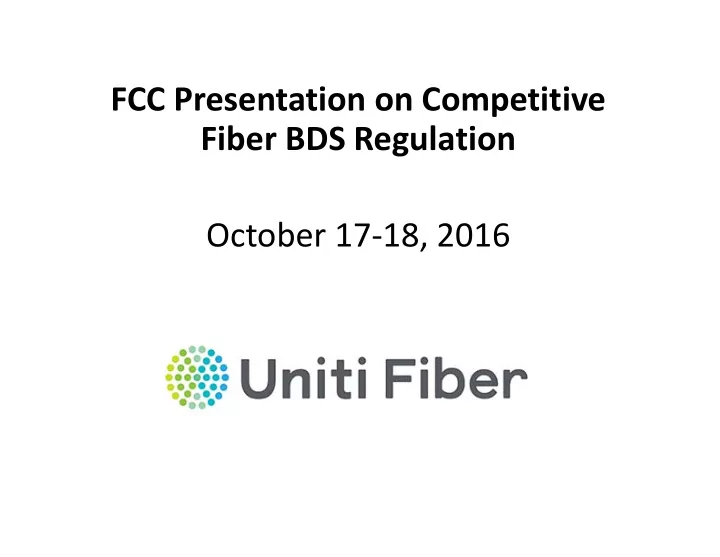

FCC Presentation on Competitive Fiber BDS Regulation October 17 ‐ 18, 2016
Background on Uniti Fiber • Uniti Fiber is a leading competitive provider of infrastructure solutions, including cell site backhaul and small cell for wireless operators and Ethernet, wavelengths and dark fiber for telecom carriers and enterprises. • Uniti Fiber provides a variety of network connectivity options in lower ‐ tier and rural markets where customers struggle to find reliable, scalable and affordable solutions. • Uniti Fiber’s growing infrastructure spans 19 states and almost 590,000 fiber strand miles. • We connect over 5,200 customer connection locations with local access to 2,600 municipalities and dozens of utilities. • Uniti Fiber specializes in cell site backhaul for wireless carriers. It has been awarded backhaul services from major wireless providers to support 3G (EVDO, HSPA) and 4G (WiMax, LTE) deployments. • Uniti Fiber delivers customized solutions wherever its customers’ toughest challenges exist. 2
Uni Uniti Fiber Fiber’s Net Network ork Ma Map 3
-<>-0 -4• - ~ {: ~ Uniti Fiber's Typical Network Architecture Fiber Ba c kbone Fiber Backbone a Swit< Fi be r Lateral Wkele" c , .,n., h (MSC/MTSO) Uniti Fiber Point of Presence (PoP) Fi ber Extension Mic r owave Hub 4 : :~: Uniti Fiber
Uniti Fiber supports the proposed approach to Ethernet sold by CFPs • We understand and support the current light touch regulation of CFPs Ethernet ‐ BDS in Chairman's proposed order. • Market power has always been the sine qua non of price regulation and should remain so. • Uniti Fiber has no market power and always faces competition from the ILEC, cable companies and other CFPs. • Uniti Fiber primarily operates in the backhaul market where the customers engage in comprehensive competitive bidding processes with numerous fiber providers. • Uniti Fiber opposes benchmark regulation of CFPs as it is unnecessary and would undermine the Commission’s goals of fostering competition and encouraging construction of new competitive fiber networks. 5
Uniti Fiber demonstrates the success of “Light Touch” regulation of CFPs • Uniti Fiber is investing millions of dollars to build new networks in lower tier and rural areas. • The company spends a significant portion of its cash flow and revenue on building new fiber routes. • Uniti fiber sells its customers complex solutions to their fiber networking needs, not off the rack point to point circuits. • Uniti Fiber and other CFPs undertake the difficult, expensive and time consuming process of wiring businesses, cellular towers, and other key areas for broadband. 6
The Commission should reject proposals to undermine the “Light Touch” regime for CFPs • The Commission should reject Verizon’s arbitrary suggestion that CFPs be subject to benchmarks immediately if they offered Ethernet in 2005. • The Commission should also reject Verizon’s suggestion that all Ethernet providers should be regulated, beginning in approximately 3 years, because there is no basis for the Commission to conclude at this time that CFPs will have market power. • When CFPs build in new markets they construct new networks from scratch regardless of what year the ILEC received forbearance or when the CFP initially offered Ethernet services in distant markets. • Neither Verizon nor any other proponent of applying benchmark pricing to CFPs has offered a rational explanation for doing so now or three years in the future. 7
Benchmark regulation of CFP pricing would harm competition and impede fiber deployment • Benchmark regulation of Uniti Fiber’s pricing would create uncertainty, raise the cost of capital and discourage new investment. • Investment capital would dry up as equity and debt sources fear uncertainty • Benchmarks based on ILEC costs would hamper investment because CFPs have higher costs – including for capital. • Benchmark regulation would discourage CFPs from investing leaving customers with no choice but the ILEC 8
Benchmark regulation of CFP pricing would not be administrable • CFPs sell advanced technology solutions, not point to point circuits with discrete elements. • Mapping pricing of legacy TDM service (special access) to CFPs complex solutions would be unworkable . • Many CFP sales are single ‐ package sales to multi ‐ location customers spanning multiple different ILEC territories, with different benchmarks or none at all. • Benchmarks based on ILEC costs would hamper investment because CFPs have higher costs – including for capital. 9
Recommend
More recommend